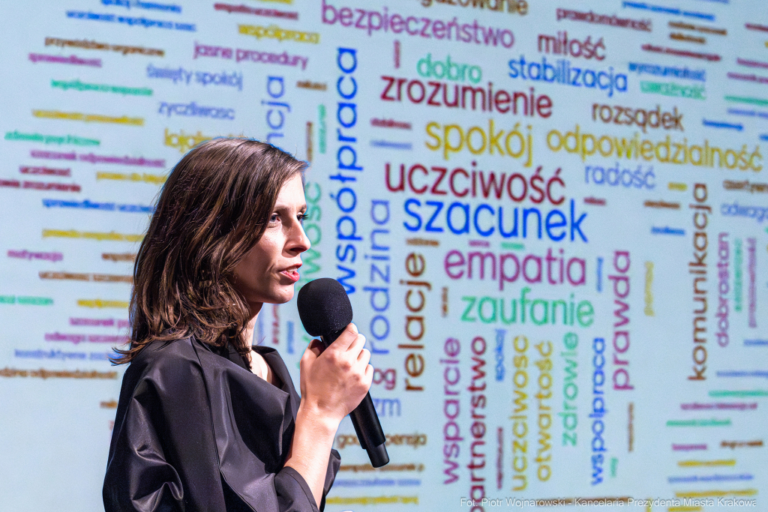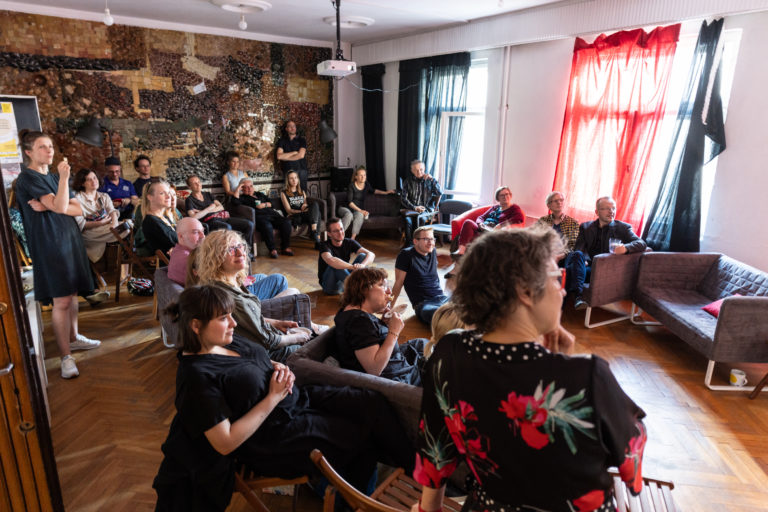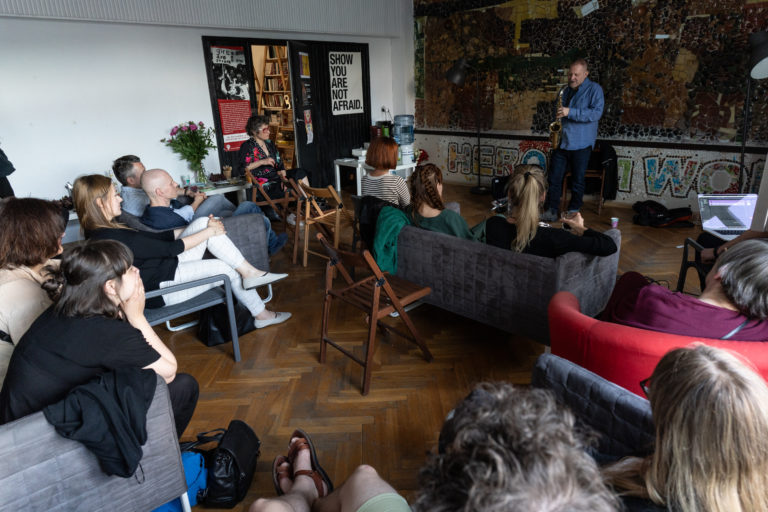Author: Katarzyna Przyborska
Maria Klaman’s journey from the independent scene on Poland's Baltic coast to the deputy mayor of Kraków exemplifies the growing power of alliances between local authorities and the independent cultural and media sectors. Once an activist and leader in Poland’s civic movements, Klaman brings grassroots ideals into Kraków's municipal leadership, advocating for participatory democracy and community-centred governance. Her path illustrates how a background in activism can shape a new kind of politics—based on transparency, inclusiveness, and collaboration. Klaman’s journey shows the significant role of fostering bonds between public authorities and independent cultural and media players to bridge divides and create a more engaged society.

Maria Klaman in Kraków – © P. Wojnarowski
Maria Klaman is a deputy mayor of Kraków, Poland's second largest city, former capital, and seat of the Polish kingdom. When Cordoba merchant Ibrahim ibn Jacob visited the area around 965 and described his journey, Kraków was already quite well established, at the crossroads of trade routes, on the river Vistula. Kraków's long history and traditions are relevant to its politics, because it's its identity–being from here–that counts here. And Maria Klaman comes from Kashuby, a distant region on the Baltic coast, with a completely different history. In Kraków, she has no family, no wide network of acquaintances, and no support from the party under whose auspices she became deputy mayor. She signed up to the New Left party somewhere along the way from Sopot, marking her way from her past activist years, to her political path now leading to Kraków.
And as there is strong divisions among the left parties and party officials in Kraków, Maria Klaman fell straight into political hot water.
Punches Above Her Weight
Maria Klaman is well aware that her career is rather unorthodox. As a politician from a major centrist party explained to her: “Maria, your colleagues and my colleagues who have been in the youth movement since they were kids, carrying portfolios for senior politicians, organising party meetings and events, they must be terribly envious of you.” Klaman didn't carry any portfolios. She has spent the last few years working in local government in Sopot, where she headed the city's Local Government Office. She also participated in the organisation Yes! for Poland, a Polish association and a local government movement. She worked with Jacek Karnowski, a politician from the Civic Platform (the party headed by Prime Minister Donald Tusk), the long-serving mayor of Sopot and chairman of Yes! for Poland, who is now an MP.
She was offered the job while still working at the School of Leaders, a hotbed for social and political elites. The school works to create conditions where those with very different views have to start communicating with each other, have to get along and seek common ground. There, Klaman led participatory activities, democracy workshops, and developed political and local government leadership programmes.
When I tell her that her friends have told me that they value her for daring to “punch above her weight,” she grimaces a bit; that's not exactly how it was, she says, but she admits that being invited to work with Jacek Karnowski, the mayor of Sopot, was a challenge.
It was a real transition from activism, from working in NGOs, to politics at the local government level. Especially as the Mayor of Sopot is a conservative, a Catholic. However–as Klaman says–he has the gene for justice and social sensitivity. That explains why he believes, for example, that LGBT people have the right to live their lives as they wish, even if it does not align with his party’s opinion. Another thing that is not necessarily typical of a politician; he did not put Klaman in his shadow. It's often the assistants–the women–who sit in the back room doing the thankless but necessary work, while the more recognisable politicians take all the credit. Karnowski treated his deputies with equality and appreciation, promoting and preparing the next generation to pick up the baton.

Krytyka Polityczna community centre in Gdańsk, July 2022 – © Jakub Szafrański
Participation at the Core
In Kraków, Klaman is responsible for education, housing, and social policy. This also includes the participatory budget, that is, money allocated to projects proposed by residents. She says her dream is for residents to have deeper conversations with each other, for neighbours to see and understand each other's needs. In her view, the role of the city government is to meet those needs, as best it can, and to set priorities. Subsidies for education are never enough, but reads have to be build, and then there are the councillors, who represent the residents of a particular district, an estate. Negotiations on the budget are set for late fall.
Klaman herself comes from an NGO background; fifteen years ago she founded the Krytyka Polityczna (KP) community centre in Gdańsk, a left-wing organisation that challenged commonly accepted dogmas in the midst of Poland's increasing neoliberalism. At that time, in 2009, it was one of the first places open to different groups, organisations. The European Solidarity Centre in Gdańsk had not yet opened, so when someone wanted to organise something, they came to the Krytyka Polityczna community centre. There, Klaman earned a reputation as a good and resourceful organiser. It was her friends from university, from her philosophy course, which got her involved, encouraging her that there would be a club, there would be organised debates.
To create a space for debate, they really had to work hard. “When we set up the Krytyka Polityczna community centre, it was us that had to rip up the old carpet, to bring in the chairs, to do everything ourselves, from scratch,” recalls Agnieszka Wiśniewska, editor-in-chief of Krytyka Polityczna’s media platform. “Then the debates started, and then the accounting, the Excel spreadsheets–we had to learn everything as we went.” Maria Klaman proved courageous, ready to learn new things, and ready to take responsibility. For a while, she was the director of the Krytyka Polityczna club in Gdańsk.
She co-authored the book Partycypacja (Participation), published by KP. Her 2012 bio describes her as a “philologist, philosopher, editor, main coordinator of the KP Community Centre in Tricity. Promoter of participatory democracy.” Her experience in Gdańsk was precisely the participatory practice she described in the handbook. The idea for the new plan for Waryński Square in Gdańsk came from the local community, which involved the city authorities, experts and institutions in consultation with the residents. The consultations were not superficial, but in fact quite profound. They lasted for a number of days, 2-3 hours at a time, and with quite a turnout–around 200 people took part in the consultation. Though that may not seem like much, it was in a city with traditionally low levels of citizen involvement and a lack of faith in the consultations previously organised by the city–the belief that they were nothing more than a show, a waste of time; indeed, this mistrust in the authorities was only getting worse.
In Poland in the late 2000's and early 2010's, urban movements were just emerging and apolitical thinking was more common. Activists were setting up local organisations, fighting neoliberal accusations of laziness, idealism and profiting from others' work. Their position was often misunderstood; resourceful people were expected to start their own companies, not work with the community, organise themselves, and have some sort of mission or vision. On the other hand, from the NGOs' perspective, politics was something better avoided.
Krytyka Polityczna thought differently, recognising even then that action at the neighbourhood level was also politics–politics that simply could not be avoided. That politics could be another tool to bring about real change. There are many people associated with Krytyka Polityczna who are now in local government, in parliament, and even in government.
This is also Maria Klaman's experience. When the Krytyka Polityczna club in Gdańsk became a bit too cramped, she left for Warsaw. There, she joined the School of Leaders and worked at the Society for Creative Initiatives, coordinating the 'Close-up on senior citizens' councils' project and 'Workshops on democracy.'
Now, in local government, she tries to maintain close ties with NGOs, to promote them, and not to benefit from others' work, not to take credit for herself. She knows that behind each and every success there are a lot of people, and she shows that. She wants to announce the results of the participatory budget in a festive atmosphere, to celebrate those involved and their efforts. These are new practices, stemming from her experience and her conviction that what is most important is to build social bonds, to cooperate, and, well, to enjoy doing things together.

Krytyka Polityczna community centre in Gdańsk, July 2022 – © Jakub Szafrański
Doing Politics in a New Way
Klaman still has friends at Krytyka Polityczna today. She herself says that Krytyka gave her the vocabulary to name who she is and where she comes from, it gave her books that helped her to structure her values: equality, for example, and feminism.
Where did she come from? From a large, poor family. Klaman says that when she went to workshops in Germany, there, everyone introduces themselves, gives the context, what kind of family they are from, what social class. This is almost unheard of in Poland, because in Poland everyone seems to think they are middle class. And life experience is important. Klaman's parents had a farm, with nine children–Maria being the seventh. Her mum worked a lot to ensure that none of the children felt inferior at school. Such large families are rare, and it was only at university that Maria began to understand her situation both socially and politically. As in any family, everyone has their own views, and it was at home that Klaman first learned to respect differing attitudes and to seek compromise.
She quickly connects with people; she sits close and is calm, coherent, and direct. She knows that a certain distance is sometimes needed in her role as deputy mayor, but she wants to remain herself. She is Maria Klaman first, and deputy mayor second. She doesn't use the prestige of power, she is herself. She's heard that in politics “you have to put your trousers on,” “make manly decisions,” but this is changing. Women get into the corridors of power and remain themselves, with their competences and their political styles; it's not about whether they are feminine or masculine. Klaman says that, of course, it wouldn't be possible if not for the debates, protests, writing, and speaking about feminism. Women entered the political ecosystem and it began to change.
Progress is what happens when old meets new. Agnieszka Muras, co-director of the School of Leaders, sees an opportunity for conservative Kraków in Klaman's presence there. Of course, it's a challenge, and education and housing are a difficult file, but as always the biggest challenge is people. If the new deputy mayor of Kraków has enough strength, determination, and authenticity, if she focuses on a few things, not everything at once, she will go for success in small steps. And her character traits, her warmth, her authenticity, and her path from the independent cultural and media scene will help her to do that. Because, although there is a common belief that once you enter politics, there's no going back, that you can't go back to being who you were before, if you have a strong backbone, you can do politics your way.
Published on November 6th, 2024
About the author:
Katarzyna Przyborska is a cultural anthropologist, graduate of The Graduate School for Social Research IFiS PAN, a mother and journalist at KrytykaPolityczna.pl. She was an editor at the KARTA Center and at Newsweek Poland (Historia). She authored the book Żaba (Frog), discussing ecology for children, published by Krytyka Polityczna.